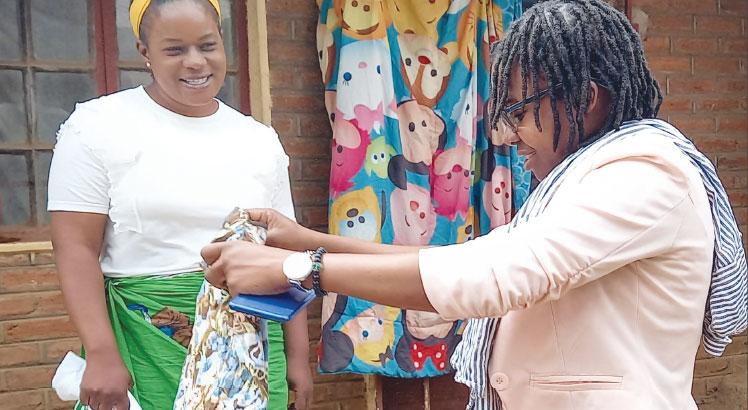At the foot of Michiru Hill in the commercial city of Blantyre lies Chilomoni Township, home to 45-year-old Vera Masina, a business lady working hard to beat Malawi’s worsening economic hardships.
For years, the mother of three has survived urban poverty by selling secondhand clothes known as kaunjika.
The hand-to-mouth business faced a blow in 2020 when the Covid-19 pandemic paralysed all spheres of life not only in Malawi, but worldwide.
Like many small-scale entrepreneurs, Masina’s business collapsed, plunging her into abject poverty.
Masina (L) helping a customer at her business place
“Before the pandemic, my business was doing well, somehow. Then I could make a profit of K20 000 a week, but it slumped when Covid-19 struck. Customers were not coming forth due to restrictions and changes in priorities,” she narrates.
Masina’s business bounced back in 2021, courtesy of a World Bank-funded Covid-19 Urban Cash Initiative (Cuci) project which aimed to cushion economic hardships among the urban poor amidst the Covid-19 pandemic.
In Blantyre, the project benefited 1 300 households, with each receiving K105 000 for investment in their individual businesses.
To sustain the programme, the Community Savings and Investment Promotion (Comsip) Cooperative Union, through its livelihood support programme, assisted the beneficiaries in establishing Savings and Loan groups and trained them in finance and business management to build their capacity.
The K20.5 billion project, comprising three months of cash disbursement, was implemented from January to June 2021 and benefited about 135 500 households in the country’s four cities of Blantyre, Zomba, Lilongwe and Mzuzu.
After getting her share, Masina joined fellow entrepreneurs in her area and formed the Chigwirizano cluster which now comprises 38 members.
“I used cash to resuscitate my business, I bought a bale of second-hand clothes, the business has thrived and I am making more profits than before. In our group, we save and borrow each other money to support our businesses,” she said.
Another member of the Chigwirizano Cluster, Carol Chinyama said the business she is running after receiving the relief funds is helping her family survive as her husband lost his job following the Covid-19 pandemic.
“Life was tough, but now I can afford to provide for my family through my business. I am able to pay the rentals, utility bills, buy food and clothes for the family and pay school fees for my children,” said Chinyama who sells rice, beans and vegetables.
Blantyre City Council director of town planning Costly Chanza hailed the initiative, saying it has helped to pull back small-scale businesses that were struggling due to the Covid-19 pandemic.
He called for more such initiatives, saying urban poverty is mostly sidelined as projects such as social cash transfers mostly target those in rural settings.
Said Chanza: “Urban poverty is far much worse than rural poverty because people in rural areas do not pay for most of the essentials including land. However, even though the cities contribute more to the country’s gross domestic product, the funding we get is so minimal that we are unable to implement programmes aimed at cushioning people from urban poverty.”
Bessie Msusa, chief economist in the Ministry of Finance and Economic Affairs’ Poverty Reduction and Social Protection Division, says government plans to introduce more social protection programmes in the urban areas to close the gap.
The 2021 Malawi National Human Development Report shows that urban poverty rates increased from 17.7 percent in 2016-17 to 19.2 percent in 2019-20.
The report cites the pandemic as having worsened the poverty situation, particularly in urban areas, as people lost jobs, and due to depressed markets.
The disease also worsened revenue collection due to subdued economic activity following restrictions that were imposed to contain the spread of coronavirus.
World Bank social protection specialist Hugo Brousset expressed satisfaction with the achievements registered in Cuci project and promised more support from the Bank.
He advises the beneficiaries to expand their income activities so that they can support their children who are the future generation of Malawi.
“We are here to work together as one unit in advancing your livelihoods,” he says.
Comsip chief executive officer Tenneson Gondwe commended the members for continuing with their businesses even after the project was phased out.
“Comsip will continue to work with the members, guiding them so that their businesses continue and their livelihoods are uplifted,” he said.
The post Confronting urban poverty appeared first on The Nation Online.
 Moni Malawi
Moni Malawi 
